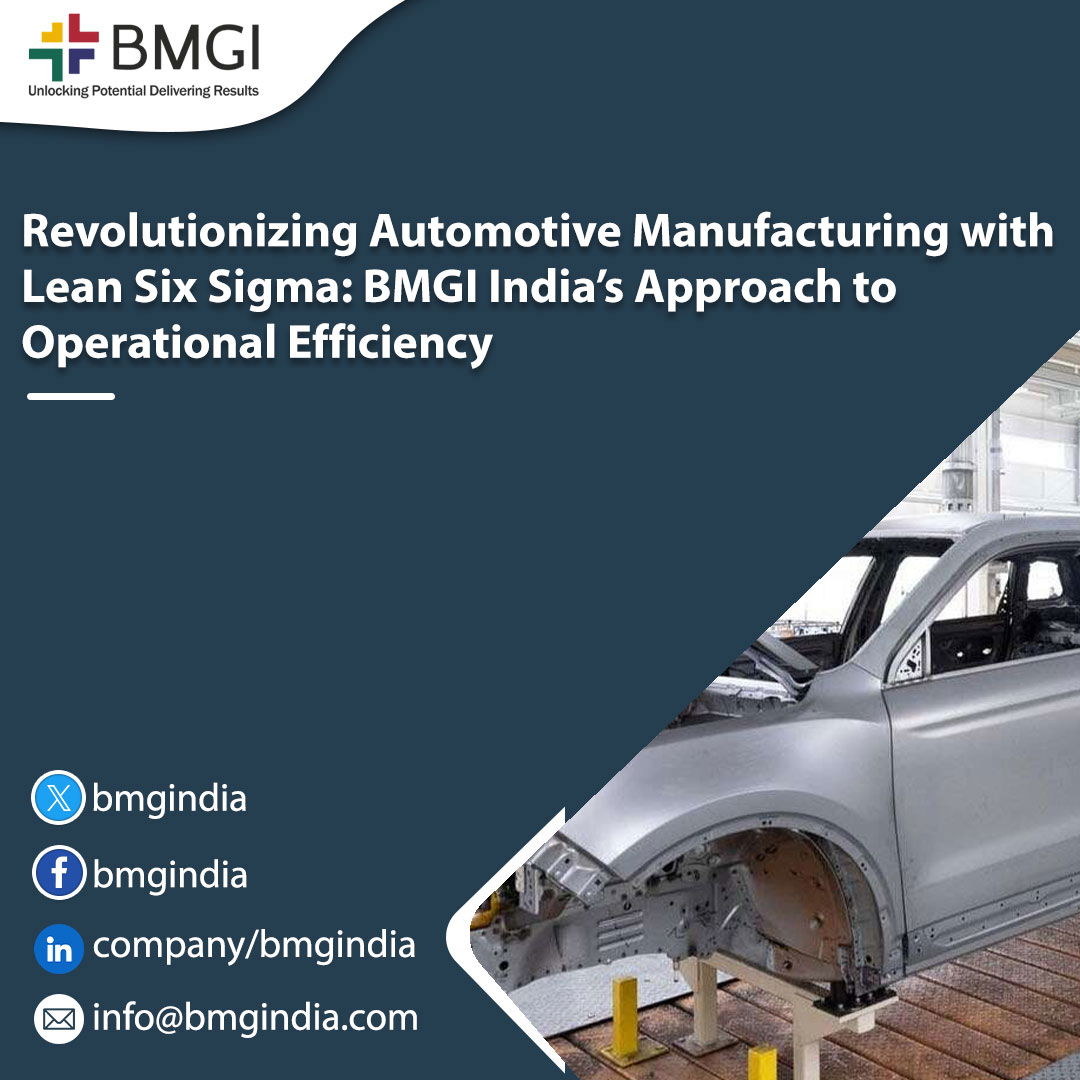Revolutionizing Automotive Manufacturing with Lean Six Sigma: BMGI India’s Approach to Operational Efficiency
The automotive industry is a cornerstone of global manufacturing, constantly striving to balance quality, cost, and efficiency in an increasingly dynamic landscape. To meet these challenges, Lean Six Sigma has emerged as a transformative methodology that drives operational efficiency by streamlining processes, eliminating waste, and improving product quality. BMGI India, with its deep expertise in Lean Six Sigma, helps automotive manufacturers enhance their operations, reduce costs, and achieve sustainable growth.
The Role of Lean Six Sigma in Automotive Manufacturing
Lean Six Sigma combines the principles of Lean methodologies, which focus on waste reduction, with Six Sigma’s emphasis on minimizing process variability and defects. This integrated approach is particularly effective in automotive manufacturing, where precision, efficiency, and customer satisfaction are paramount.
Key benefits of Lean Six Sigma in automotive manufacturing include:
- Waste Elimination: Identifying and removing non-value-added activities to enhance efficiency.
- Defect Reduction: Addressing process inconsistencies to improve product quality.
- Cycle Time Optimization: Accelerating production timelines to meet market demands.
- Cost Savings: Streamlining operations to reduce operational expenses.
How BMGI India Implements Lean Six Sigma in Automotive Operations
BMGI India partners with automotive manufacturers to deploy Lean Six Sigma methodologies tailored to their unique challenges. The firm’s expertise spans process optimization, supply chain efficiency, and quality enhancement, enabling clients to achieve measurable improvements across operations.
Key Steps in BMGI’s Approach:
- Process Mapping and Analysis:
- Identifying bottlenecks and inefficiencies in production workflows.
- Understanding root causes of defects and delays.
- Data-Driven Problem-Solving:
- Leveraging Six Sigma tools like DMAIC (Define, Measure, Analyze, Improve, Control) to address process variability.
- Implementing statistical analysis for informed decision-making.
- Lean Principles Integration:
- Streamlining operations to remove waste and improve throughput.
- Standardizing processes for consistent performance.
- Continuous Improvement Culture:
- Training teams in Lean Six Sigma principles for sustained operational excellence.
- Encouraging cross-functional collaboration to ensure ongoing efficiency.
Impact of Lean Six Sigma on Automotive Manufacturing
The implementation of Lean Six Sigma delivers tangible benefits for automotive manufacturers, including:
- Improved Product Quality: Enhanced consistency and reliability in production outputs.
- Faster Time-to-Market: Accelerated production cycles to meet customer demands.
- Lower Operational Costs: Reduced waste and optimized resource utilization.
- Enhanced Customer Satisfaction: Delivering high-quality products on time.
Why Lean Six Sigma is Essential for Automotive Manufacturers
As customer expectations rise and competition intensifies, automotive manufacturers must continually innovate and optimize their operations. Lean Six Sigma provides a robust framework to tackle these challenges, ensuring manufacturers remain agile, efficient, and quality-focused.
Key Advantages of Lean Six Sigma:
- Aligns production processes with strategic business goals.
- Enhances collaboration across departments and supply chains.
- Supports scalability and adaptability in a dynamic market.
Conclusion
The automotive industry’s success hinges on its ability to deliver high-quality products efficiently and cost-effectively. By leveraging Lean Six Sigma methodologies, businesses can revolutionize their operations, eliminate waste, and maintain competitive advantage. With BMGI India’s expertise, automotive manufacturers can implement Lean Six Sigma to achieve operational excellence, ensuring sustainable growth and long-term success.

